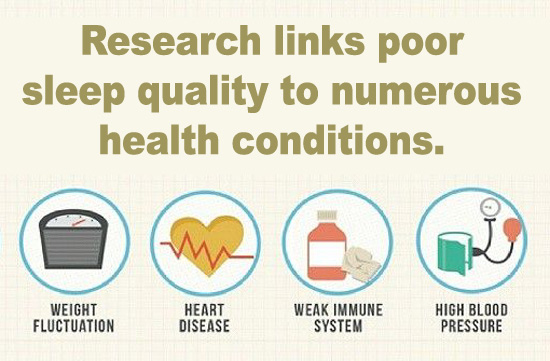When people can’t fall asleep they typically reach for an over-the-counter sleep medication, or alcohol. In more severe cases they obtain a prescription for sleeping medication.
The problem with all these choices is they may help you fall asleep, but they seldom keep you asleep. And when you do stay asleep it’s not a fitful, refreshing sleep.
This means you are not reaching and maintaining continuous sleep—including the crucial REM stage—and will not reap the benefits sleep is meant to provide.
Adding to the mountain of evidence proving the value of sound sleep, new research on dementia patients has shown that how well people sleep has a dramatic impact on how severe the dementia symptoms are the next day. Of particular significance is “sleep continuity”—the extent which people stay asleep after initially falling asleep.
The study was conducted in the United Kingdom by Brighton and Sussex Medical School, the University of Surrey and University of Sussex.
Study details
Researchers assessed sleep in people living with dementia over a two-week period. Each day researchers assessed the daytime cognition and dementia symptoms—including memory ability—of the study subjects.
Sleep quality was assessed both by self-reporting and objectively by activity monitors placed on the wrist during the test period.
In addition to activity monitoring and participant input, researchers also asked the partners/caregivers of each patient to comment on their daily behavior patterns.
Detailed analyses of the sleep data indicated that sleep continuity was among the most predictive aspects of next day symptoms.
“Sleep continuity” refers to the extent which one can stay asleep after initially falling asleep.
It was found that increased sleep continuity was related to feeling more alert, with less everyday memory errors and less behavioral problems.
An important caveat to the findings was that a point is reached where too much time in bed starts reversing the positive benefits. When test subjects overslept sleep continuity actually decreased—and so did the demonstrated health improvements.
The research findings were published in Alzheimer’s & Dementia: Diagnosis, Assessment & Disease Monitoring in May 2022.
Related study
In another new study on the importance of restive sleep, researchers in Germany identified how the brain “triages” emotions during dream sleep. The researchers found that the brain actually consolidated the storage of positive emotions while dampening the consolidation of negative ones during dream sleep—also known as REM sleep.
The work builds on earlier research on the importance of sleep in mental health, and opens new possibilities with regards to therapeutic treatment.
In humans, excessively negative emotions lead to pathological states—a growing problem in Western countries, where approximately 15% of the population is affected by persistent anxiety and severe mental illness.
And since it is now known the brain helps to reinforce positive emotions during REM sleep, while at the same time weakening traumatic emotions, sleep quality moves to the forefront in mental health treatment.
Details of the study can be found in the May 2022 issue of Science.
Alternatives to drugs
Fortunately there are non-drug options for improving sleep continuity and consistently reaching the REM sleep stage. These options include changes in diet, exercise, keeping sleep hours consistent, avoiding stimulants, and taking sleep-supporting nutritional supplements.
See listing at the bottom of the page for a list of research-backed sleep nutrients including valerian root, L-tryptophan, chamomile flower, lemon balm and hops extract.
All of these nutrients can be found in Optimal REM Sleep from Optimal Health Systems.
Optimal REM Sleep is unique among herbal sleep products: Rather than helping you fall asleep for a single night, it provides the nutrients you need to attain REM sleep consistently over time.
Learn more by clicking the banner ad on this page, or by following this link.
– – –
Sources: UK study: Alzheimer’s & Dementia: Diagnosis, Assessment & Disease Monitoring; German study: Science.
Nutrients known to support sleep continuity:
Nutritional support for sleep disorders can be found in a number of research-backed nutrients.
• Valerian root, perhaps the best known of herbal sleep aids, dates back over two thousand years to the Greek and Roman Empires. It was noted by Hippocrates, who recommended if for headaches, nervousness, trembling, and heart palpitations.
• L-Tryptophan is an amino acid found in most proteins—both animal and plant. It is essential in humans, meaning that the body cannot synthesize it and it must be obtained from the diet. It is perhaps the most widely researched and accepted nutrient to help calm the body, and is found in many natural sleep aids.
• Chamomile flower is a perennial herb that has been shown to promote a relaxed and calming state of mind which helps the body fall asleep faster. These benefits may be attributed to an antioxidant called apigenin. Apigenin binds to specific receptors in the brain that help decrease anxiety and initiate sleep.
• Lemon balm is another sleep herb with a history dating back over 2,000 years. It is listed in the Historia Plantarum, dated to around 300 BC. Today it is the main ingredient of Carmelite water, which is still for sale in German pharmacies. Research shows it has a calming and sleep-promoting effect, which is achieved in part by increasing GABA levels.
• Hops extract, an essential ingredient in beer brewing, has been used medicinally since medieval times. Early physicians observed that hops pickers tired very easily during the harvest and assumed that a sticky resin excreted by the cut plant caused this effect. Modern studies have corroborated these early observations.
Read more Sleep Health articles on Optimal Health Insider here.



